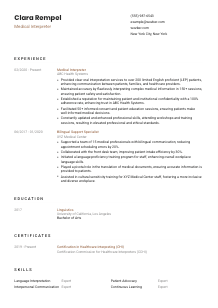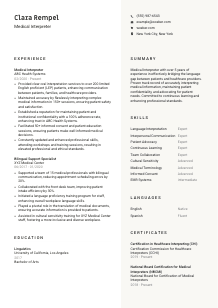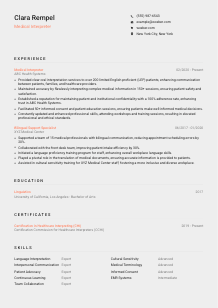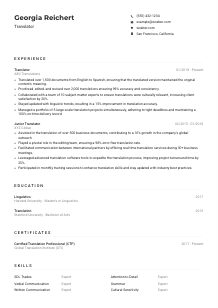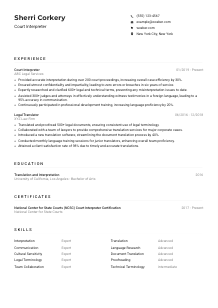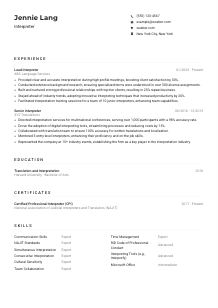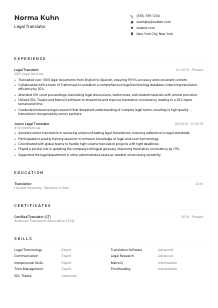Medical Interpreter CV Example
Breaking barriers, but your CV feels lost in translation? Speak the language of career success with this Medical Interpreter CV example, articulated using Wozber free CV builder. Discover how to render your linguistic and cultural expertise to meet job requirements, ensuring your career journey is as clear and meaningful as the conversations you facilitate!
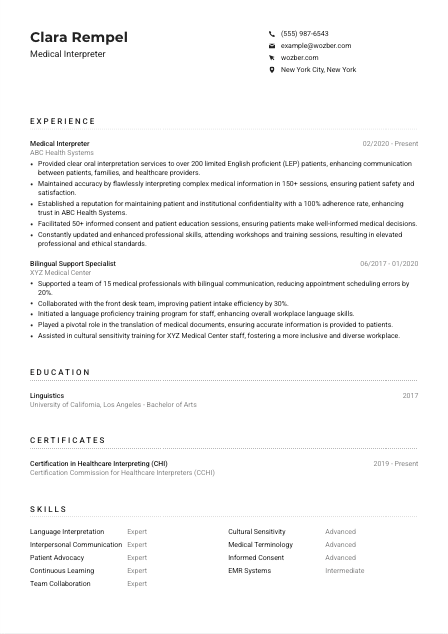
How to write a Medical Interpreter CV?
Hello, aspiring Medical Interpreter! Climbing the career ladder in the world of medical interpretation demands more than just linguistic prowess; it requires a CV that showcases your unparalleled skills and experiences. With the Wozber free CV builder, we're on a mission to craft a CV that not only meets job specifications but excels in standing out.
This guide will take you through crafting an ATS-compliant CV, tailored perfectly to your dream job. Let's turn your career aspirations into reality, shall we?
Personal Details
First impressions count, especially on paper. The Personal Details section of your CV should whisper professionalism while shouting qualifications. It's the first handshake with your future employer, so let's make sure it's firm and memorable.
1. Name That Commands Attention
Your name is your banner. Ensure it's prominently placed at the top of your CV in a clear, bold font. This isn't just any name; it's the name of a dedicated Medical Interpreter ready to make an impact.
2. Precise Job Title
Immediately below your name, align your aspiration with reality by stating "Medical Interpreter" as your title. This echoes the job description and subtly aligns your CV with the role floating in the vast sea of applications.
3. Contact Information Pristine
List your phone number and a professional email address using a straightforward format like firstname.lastname@email.com, ensuring a typo-free entry. Remember, this is how your future employers will reach you to say, 'Welcome aboard!'
4. Connection to the City
Specifying "New York City, New York" not only pinpoints your geographical advantage but aligns perfectly with the job's location requirement. It reassures the employer of your accessibility and readiness to dive into the position without the delays of relocation.
5. Online Professional Presence
If you have a LinkedIn profile or a professional website, include it. Ensure it's polished and echoes the professionalism of your CV. This showcases your digital savvy and gives a more holistic view of your professional landscape.
Takeaway
In the digital age, you are much more than a piece of paper. But that piece of paper is your golden ticket into the interview room. Tailor your Personal Details to mirror the employer's needs and take the first step towards your new role with confidence.





Experience
The heart and soul of your CV is the Experience section. Here, we don't just list our past roles; we tell our professional story, demonstrating our journey and achievements as a Medical Interpreter.
- Provided clear oral interpretation services to over 200 limited English proficient (LEP) patients, enhancing communication between patients, families, and healthcare providers.
- Maintained accuracy by flawlessly interpreting complex medical information in 150+ sessions, ensuring patient safety and satisfaction.
- Established a reputation for maintaining patient and institutional confidentiality with a 100% adherence rate, enhancing trust in ABC Health Systems.
- Facilitated 50+ informed consent and patient education sessions, ensuring patients make well‑informed medical decisions.
- Constantly updated and enhanced professional skills, attending workshops and training sessions, resulting in elevated professional and ethical standards.
- Supported a team of 15 medical professionals with bilingual communication, reducing appointment scheduling errors by 20%.
- Collaborated with the front desk team, improving patient intake efficiency by 30%.
- Initiated a language proficiency training program for staff, enhancing overall workplace language skills.
- Played a pivotal role in the translation of medical documents, ensuring accurate information is provided to patients.
- Assisted in cultural sensitivity training for XYZ Medical Center staff, fostering a more inclusive and diverse workplace.
1. Job Requirements Breakdown
Examine the job description, highlighting requirements such as interpreting between LEP patients and healthcare providers. This will be your blueprint to tailor your accomplishments to what truly matters for the role.
2. Chronology & Clarity
List your relevant positions in reverse chronological order. For each, include the job title, company name, and dates of employment, ensuring a clear path of your professional journey is illustrated.
3. Achievement Amplification
Under each role, craft bullet points that speak directly to your contributions and achievements. For instance, "Provided interpretation in over 200 medical consultations, ensuring accurate and sensitive communication between patients and healthcare providers."
4. Quantifiable Success
Whenever possible, back your achievements with numbers. Quantifiable success, such as reducing scheduling errors by 20%, paints a vivid picture of your impact and efficiency.
5. Relevance is Key
Stick to experiences that elevate your candidacy for the Medical Interpreter role. Though you might be proud of unrelated accomplishments, the focus here is your ability to excel in medical interpretation.
Takeaway
Transform your Experience section into a compelling narrative of your professional journey. By finely tuning each bullet point to reflect the job description, you're not just applying; you're demonstrating you're an invaluable asset ready to rise to the occasion.
Education
The foundation of any impressive CV lies in its Education section. Here, we don't just list our degrees; we align our educational background with the job's requirements, making a clear connection between your studies and your career path.
1. Focus on Required Degrees
Identify and emphasize the educational requirement directly from the job description. For a Medical Interpreter, showcasing your "Bachelor's degree in Linguistics, Translation, Interpretation, or a related field" solidifies your foundational knowledge in the field.
2. Present with Pristineness
Adopt a simple format: degree, field of study, institution, and graduation date. This streamlined presentation allows hiring managers to swiftly verify your qualifications against their requirements.
3. Match Degree with Demands
Ensure the degree you list directly reflects the job's academic requirements. If the role seeks a Bachelor's in Linguistics and that's what you have, make sure it's clearly stated, bridging your academic background to the job effortlessly.
4. Coursework Counts
While not always necessary, citing relevant coursework can bolster your candidacy, especially for specialized roles or newly graduated individuals. Highlighting courses related to medical terminology or healthcare communication can add depth to your qualifications.
5. Additional Academic Achievements
If you excelled in your studies or participated in related extracurricular activities, mention these. However, gauge the appropriateness based on the job level; for more senior roles, focus on professional achievements.
Takeaway
Your Education section is more than a formality; it's a pillar of your professional identity. Let it resonate with the Medical Interpreter role by carefully matching your degrees and coursework with the job's educational prerequisites. This bolsters your application, portraying you as the perfect scholarly match for the position.
Certificates
In the specialized field of medical interpretation, certifications can be your golden key. They underscore your commitment to professional excellence and adherence to industry standards.
1. Highlight Relevant Certifications
Pinpoint certifications mentioned in the job description, like "Certification from an accredited interpreter training program or through a recognized national interpreter certification agency (e.g., CCHI or NBCMI)." Listing these certifications forefronts your CV, drawing an immediate connection to the role's needs.
2. Quality Over Quantity
Focus on certifications that align closely with the Medical Interpreter position. This isn't about showing off every certificate you've earned but showcasing those that directly contribute to your qualification for the job at hand.
3. Dates Display Diligence
If your certification is recent or has an expiration date, include these details. This demonstrates to employers that your qualifications are current and you're committed to staying up-to-date in your field.
4. Continuous Learning
The medical and linguistic fields are always evolving. Show that you're evolving with them by pursuing ongoing education and updates to your certifications, keeping your skills sharp and relevant.
Takeaway
Your selection of certifications reveals much about your dedication and professionalism. In a field where precision and up-to-date knowledge are paramount, the right certifications can set you apart as a prime candidate. Choose wisely, ensuring each certification underscores your readiness and suitability for the Medical Interpreter role.
Skills
Crafting a Skills section that resonates with the job requirements is like speaking the hiring manager's language fluently. It's your chance to underline your professional toolkit and communicate your readiness to excel as a Medical Interpreter.
1. Extract Key Skills
Review the job listing to identify both stated and implied skills. For the Medical Interpreter position, proficiencies like "Language Interpretation," "Interpersonal Communication," and "Medical Terminology" are directly pulled from the job's demands, ensuring your skills section speaks the same language as your potential employer.
2. Prioritize Pertinent Proficiencies
Zero in on the skills that best match the job description. This isn't just a list, but a curated showcase of why you're the perfect candidate. Ensure your most relevant skills are front and center, echoing the role's requirements.
3. Concise and Captivating
Though it may be tempting to list every skill under the sun, focus on quality over quantity. A concise list of skills tailored to the job encourages the hiring manager to recognize your expertise at a glance.
Takeaway
Your Skills section is the pulse of your professional prowess. Handpick each skill with intention, aligning closely with the job description. This strategic selection not only proves your qualifications but also demonstrates your understanding of the role's intricacies.
Languages
For a Medical Interpreter, linguistic proficiency isn't just a skill, it's the essence of the role. This section is where you demonstrate your ability to navigate complex conversations with ease and precision.
1. Align with Job Language Requirements
Carefully examine the job description for language needs. For example, fluency in "English and a second language, as determined by institutional need (commonly Spanish, Mandarin, or Vietnamese)" is a key requirement. Placing your language proficiencies upfront, especially those mentioned in the listing, firmly aligns your capabilities with the role's demands.
2. Prioritize Primary Language Proficiencies
Start with the languages mentioned in the job description, indicating your level of fluency. This direct match speaks volumes about your qualification and readiness for the position.
3. Additional Linguistic Abilities
Listing other languages you're proficient in can only bolster your candidacy. It showcases your adaptability and potential to meet future organisational needs, even beyond the immediate scope of the job.
4. Honest Proficiency Levels
Clarity about your language proficiency levels (e.g., Native, Fluent, Intermediate, Basic) avoids misunderstandings and sets clear expectations. Accurate representation of your abilities ensures both you and your employer are on the same page from day one.
5. Emphasize the Role's Linguistic Scope
If the role involves broad linguistic tasks, highlighting your multilingual capabilities can present you as a uniquely valuable asset. This not only illustrates your proficiency but also your understanding of the role's wider impact.
Takeaway
Your linguistic skills are a powerful testament to your capability as a Medical Interpreter. Showcase them with pride and precision, ensuring they reflect the job's requirements and your potential to excel in the role. Your language abilities are not just part of your CV; they are the essence of your professional identity in this field.
Summary
A well-crafted summary is your chance to captivate your audience right from the start. It's where you encapsulate your professional identity, align it with the job's demands, and hint at the value you promise to bring.
1. Reflect on the Role
First, soak in every requirement and responsibility listed in the job description. Understanding what the employer truly values allows you to tailor your summary in a way that resonates with them.
2. Powerful Introduction
Begin with a strong statement that captures your professional essence. For instance, "Seasoned Medical Interpreter specializing in Spanish-to-English translations skilled at navigating complex medical dialogues with empathy and accuracy."
3. Highlight Core Competencies
Immediately follow up with a concise list of your key strengths directly related to the job. Make sure to weave in examples of your achievements, such as accuracies in interpretation, dedication to continuous learning, and any awards or recognitions.
4. Brevity is Brilliance
Keep your summary succinct. Aim for four impactful sentences that leave the hiring manager eager to read on. This is your elevator pitch; make every word count.
Takeaway
Your summary isn't just the introduction to your CV; it's the lens through which the hiring manager views your entire application. Tailor it with precision to the Medical Interpreter role, emphasizing your unique value and echoing the job's key requirements. Let this be the hook that piques the employer's interest and marks the beginning of a fruitful career journey.
Launching Your Medical Interpreter Journey
You've now got a treasure trove of tips to craft a CV that's not just a document, but a passport to your dream job. With these insights and the Wozber free CV builder at your disposal, you're equipped to create an ATS-friendly CV that truly represents your exceptional capabilities as a Medical Interpreter. Remember, your CV is the first step in a larger journey.
Give it the attention it deserves, and the doors it opens will lead you to uncharted territories of professional growth. Start building your future, one section at a time, and never stop reaching for the heights you're destined to achieve.

- Bachelor's degree in Linguistics, Translation, Interpretation, or a related field.
- Minimum of 2 years of professional medical interpreting experience.
- Fluency in both English and a second language, as determined by institutional need (commonly Spanish, Mandarin, or Vietnamese).
- Proven ability to effectively interpret complex medical information and terminology.
- Certification from an accredited interpreter training program or through a recognized national interpreter certification agency (e.g., CCHI or NBCMI).
- Must be located in New York City, New York.
- Provide oral interpretation services between limited English proficient (LEP) patients, their families, and healthcare providers.
- Interpret accurately, without adding, omitting, or substituting meaning, while maintaining the spirit of the conversation and cultural sensitivity.
- Respect patient and institutional confidentiality in interpreting information.
- Facilitate informed consent and patient education sessions when necessary.
- Continually maintain and improve professional, medical, and ethical standards as an interpreter.





